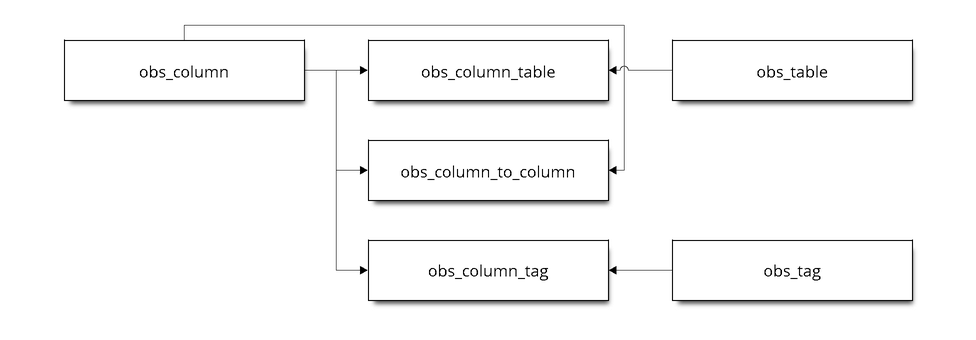Metadata model¶
Our metadata is contained in six highly related tables, which are defined using SQLAlchemy classes.
Relational Diagram¶

| Name | Description |
|---|---|
| obs_column | OBSColumn |
| obs_column_table | OBSColumnTable |
| obs_column_to_column | OBSColumnToColumn |
| obs_column_tag | OBSColumnTag |
| obs_table | OBSTable |
| obs_tag | OBSTag |
Manually generated entities¶
-
class
tasks.meta.OBSColumn(**kwargs)¶ Describes the characteristics of data in a column, which can exist in multiple physical tables.
These should only be instantiated to generate the return value of
ColumnsTask.columns(). Any other usage could have unexpected consequences.-
id¶ The unique identifier for this column. Should be qualified by the module name of the class that created it. Is automatically generated by
ColumnsTaskif left unspecified, and automatically qualified by module name either way.
-
type¶ The type of this column – for example,
Text,Numeric,Geometry, etc. This is used to generate a schema for any table using this column.
-
name¶ The human-readable name of this column. This is used in the catalog and API.
-
description¶ The human-readable description of this column. THis is used in the catalog.
-
weight¶ A numeric weight for this column. Higher weights are favored in certain rankings done by the API. Defaults to zero, which hides the column from catalog.
-
aggregate¶ How this column can be aggregated. For example, populations can be summed, so a population column should be
sum. Should be left blank if it is not to aggregate.
-
tables¶ Iterable of all linked :class:`~.meta.OBSColumnTable`s, which could be traversed to find all tables with this column.
Iterable of all linked :class:`~.meta.OBSColumnTag`s, which could be traversed to find all tags applying to this column.
-
targets¶ Dict of all related columns. Format is
<OBSColumn>: <reltype>.
-
version¶ A version control number, used to determine whether the column and its metadata should be updated.
-
extra¶ Arbitrary additional information about this column stored as JSON.
-
catalog_lonlat()¶ Return tuple (longitude, latitude) for the catalog for this measurement.
-
geom_timespans()¶ Return a dict of geom columns and timespans that this measure is available for.
-
has_catalog_image()¶ Returns True if this column has a pre-generated image for the catalog.
-
has_children()¶ Returns True if this column has children, False otherwise.
-
has_denominators()¶ Returns True if this column has no denominator, False otherwise.
-
is_cartographic()¶ Returns True if this column is a geometry that can be used for cartography.
-
is_geomref()¶ Returns True if the column is a geomref, else Null
-
is_interpolation()¶ Returns True if this column is a geometry that can be used for interpolation.
Return license tags.
Return source tags.
-
summable()¶ Returns True if we can sum this column and calculate for arbitrary areas.
-
-
class
tasks.meta.OBSTag(**kwargs)¶ Tags permit arbitrary groupings of columns.
They should only be created as part of a
tags()implementation.-
id¶ The unique identifier for this table. Is always qualified by the module name of the
TagsTaskthat created it, and should never be specified manually.
-
name¶ The name of this tag. This is exposed in the API and user interfaces.
-
type¶ The type of this tag. This is used to provide more information about what the tag means. Examples are
section,subsection,license,unit, although any arbitrary type can be defined.
-
description¶ Description of this tag. This may be exposed in the API and catalog.
-
version¶ A version control number, used to determine whether the tag and its metadata should be updated.
-
Autogenerated entities¶
-
class
tasks.meta.OBSColumnToColumn(**kwargs)¶ Relates one column to another. For example, a
Textcolumn may contain identifiers that are unique to geometries in anotherGeometrycolumn. In that case, anOBSColumnToColumnobject ofreltypeGEOM_REFshould indicate the relationship, and make relational joins possible between tables that have both columns with those that only have one.These should never be created manually. Their creation should be handled automatically from specifying
OBSColumn.targets.These are unique on
(source_id, target_id).-
reltype¶ required text specifying the relation type. Examples are
GEOM_REFand ~.meta.DENOMINATOR.
-
-
class
tasks.meta.OBSColumnTable(**kwargs)¶ Glues together
OBSColumnandOBSTable. If this object exists, the related column should exist in the related table, and can be selected withcolname.Unique along both
(column_id, table_id)and(table_id, colname).These should never be created manually. Their creation and removal is handled automatically as part of
targets.TableTarget.update_or_create_metadata().-
colname¶ Column name for selecting this column in a table.
-
extra¶ Extra JSON information about the data. This could include statistics like max, min, average, etc.
-
-
class
tasks.meta.OBSTable(**kwargs)¶ Describes a physical table in our database.
These should never be instantiated manually. They are automatically created by
output(). The unique key is :attr:~.meta.OBSTable.id:.-
id¶ The unique identifier for this table. Is always qualified by the module name of the class that created it.
-
columns¶ An iterable of all the
OBSColumnTableinstances contained in this table.
-
tablename¶ The automatically generated name of this table, which can be used directly in select statements. Of the format
obs_<hash>.
-
timespan¶ An OBSTimespan instance containing information about the timespan this table applies to. Obtained from
timespan().
-
the_geom¶ A simple geometry approximating the boundaries of the data in this table.
-
description¶ A description of the table. Not used.
-
version¶ A version control number, used to determine whether the table and its metadata should be updated.
-
geom_column()¶ Return the column geometry column for this table, if it has one.
Returns None if there is none.
-
geomref_column()¶ Return the geomref column for this table, if it has one.
Returns None if there is none.
-
-
class
tasks.meta.OBSColumnTag(**kwargs)¶ Glues together
OBSColumnandOBSTag. If this object exists, the related column should be tagged with the related tag.Unique along
(column_id, tag_id).These should never be created manually. Their creation and removal is handled automatically as part of
targets.TableTarget.update_or_create_metadata().